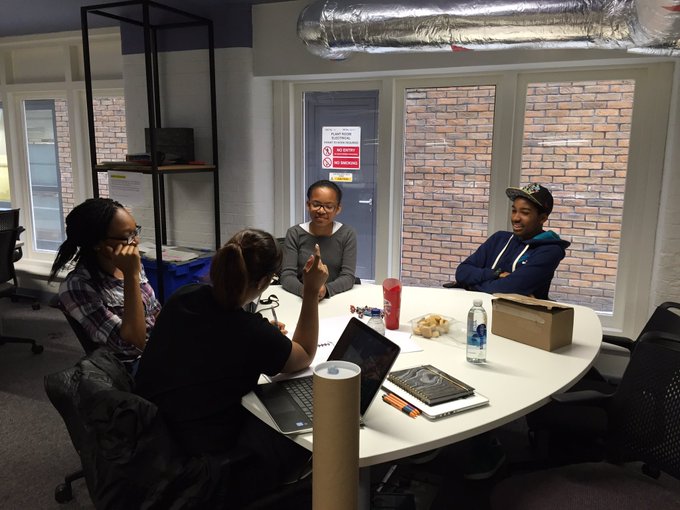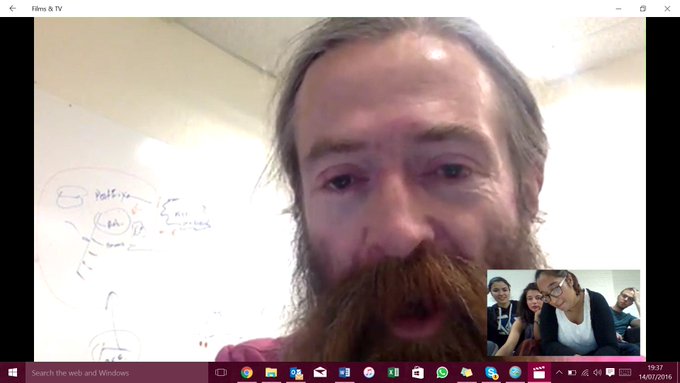| Line 75: | Line 75: | ||
<h1> Filipe from UCL institute of ageing </h1> | <h1> Filipe from UCL institute of ageing </h1> | ||
<p> Filipe said that our project is really interesting but tackling oxidative stress may not have a large impact on the healthspan of a human. He said that the theory of free radicals is around 50-60 years old and that there is no current evidence that oxidative stress has really effected the ageing of a cell or humans. Filipe is working on the effect on Rapamycin and the microbiome, so he really gave an interesting perspective to our project </p> | <p> Filipe said that our project is really interesting but tackling oxidative stress may not have a large impact on the healthspan of a human. He said that the theory of free radicals is around 50-60 years old and that there is no current evidence that oxidative stress has really effected the ageing of a cell or humans. Filipe is working on the effect on Rapamycin and the microbiome, so he really gave an interesting perspective to our project </p> | ||
| − | |||
<h1> Maximina interview Thursday July </h1> | <h1> Maximina interview Thursday July </h1> | ||
<p> </p> | <p> </p> | ||
| − | |||
<h1> Outreach activity workshop with year 12 students at the sutton trust summer school Thursday 28th July </h1> | <h1> Outreach activity workshop with year 12 students at the sutton trust summer school Thursday 28th July </h1> | ||
Revision as of 15:23, 20 July 2016
Synthetic Biology survey + General public
We were really interested to find out what the general public think about synthetic biology to find out how it is perceived by people. So we started by releasing a short survey about public perception of synthetic biology, genetically engineered organisms and our project.The survey also gathered the gender, age, and level of education (including their level of knowledge in Synthetic biology) information. We felt that it was important to gather data that accurately represented the variety of knowledge in the general community.
The general survey got results from Spain, Mexico, UK and Portugal.
The results of the survey showed that some people still think bacteria are bad (they chose option 2 of the images). A large proportion of the sample population know a little or nothing about synthetic biology. Even though a large proportion of the population are accepting of synthetic biology, some people are still against it. When asked if you want to live longer - fewer people answered yes then compared to when they were asked if they want to live healthier longer. This shows that there is a need for our product - promoting healthier living Large population think that they have not been educated about synthetic biology. And a large proportion of the population would like children to learn synthetic biology as a part of their curriculum.
Based on the results, it is apparent that respondents felt like there hasn’t been sufficient education related to Synthetic Biology. Considering a vast majority of respondents consider GM organisms safe (81%) and beneficial (81%), we have decided to take on outreach programmes for school-age children to expand their knowledge and consciousness of Synthetic Biology.

We also distributed the survey through our Wechat account (directed towards the general public in China). The results of the survey from Wechat showed similar results to the general survey.
Resources for the younger generation
In response to the survey, we wanted to make synthetic biology and iGEM more accessible to the younger generation, and the rest of the public. So we decided that we wanted to make some resources for young children about our project, synthetic biology and ideas around synthetic biology. We have this document translated in English, German, French, Farsi, Spanish and Mandarin.
Our iGEM blog
We also wanted the general public to know about our project and iGEM so we decided to make a blog highlighting our general experiences as we go along this iGEM journey! We are also working on posting some tips for future GEM teams, based on what we are learning as we go through the process.
The Blog link: http://ucligem2016.wix.com/ucligem2016
Our App
As mobile phones are becoming increasing part of our lives, we thought that developing an app may be a great way to get more people more aware of synthetic biology. We have decided to create a game that works by getting users to create certain biobricks, where the gene of interest will only complete the biobrick if the plasmid backbone is cut with the correct restriction enzymes. We want to make it as user friendly as possible and we are hoping to integrate our project and iGEM into the app as well.
Press release
We were able make more people aware of our project by getting our project advertised through the UCL website (Biochemical engineering News section). We are also working on getting the project advertised on the UCL newsletter (myUCL).
Workshop with the younger generation
We were able to inspire the next generation of scientists, engineers, conputer scientists and phycolgists through a workshop. We told them what synthetic biology is, our project, asked them what their perception of the elderly is and ran some fun activities. We also gave the students a chance to have some lab experience.

We asked the children to draw what they think of when I said AGEING


We then asked the children to draw what they envision themselves looking like when they are 65 years old (the age when you are considered as elderly)



Also follow our vlog where we upload fun videos of the team members and vlog throughout our iGEM journey
Elderly opinion
Tea with the elderly on Saturday 16th July. Chichi was able to attend the tea session where she was able to ask some of the elderly what they thought about our idea and synthetic biology.
Skype meeting with Aubrey de Grey
huge insight to current ageing research and also provided us with tips for our project. We received a lot of help into how we can do some characterisation experiments on our lycopene idea, which Aubrey said was a good idea, if we can prove that Lycopene can survive in the gut aswell as being successfully secreted from the bacteria. He also suggested that senescence and ageing would not be a good route to go down as the genes have already been established (we possible cant do anything thats already be done within our project)

Synthetic biology showcase
Amandeep, Michelle and Abbie were presenting at the synthetic biology showcase where we got to share our project with some of the current researchers within the field. We also got the chance to talk to a member of the RRI who focus on building the bridge between science and public policy. ---Said that the project "sounds interesting but we have alot to do". He aldo suggested that we get in contact with Age UK, to organise some focus groups and find out what people who are effected think!

iGEM teams are leading in the area of Human Practices because they conduct their projects within a social/environmental context, to better understand issues that might influence the design and use of their technologies.
Teams work with students and advisors from the humanities and social sciences to explore topics concerning ethical, legal, social, economic, safety or security issues related to their work. Consideration of these Human Practices is crucial for building safe and sustainable projects that serve the public interest.
For more information, please see the Human Practices Hub.
Note
You must fill out this page in order to be considered for all awards for Human Practices:
- Human Practices silver medal criterion
- Human Practices gold medal criterion
- Best Integrated Human Practices award
- Best Education and Public Engagement award
Some Human Practices topic areas
- Philosophy
- Public Engagement / Dialogue
- Education
- Product Design
- Scale-Up and Deployment Issues
- Environmental Impact
- Ethics
- Safety
- Security
- Public Policy
- Law and Regulation
- Risk Assessment
What should we write about on this page?
On this page, you should write about the Human Practices topics you considered in your project, and document any special activities you did (such as visiting experts, talking to lawmakers, or doing public engagement).

